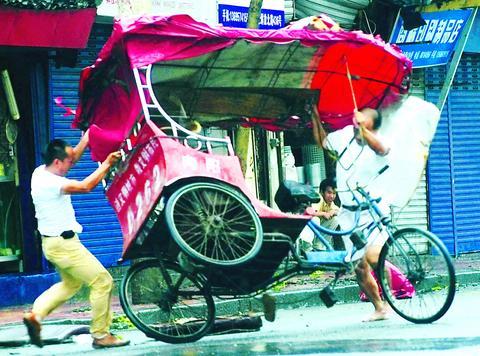At least 115 people were killed and more than 1,800 injured when a powerful typhoon ripped through eastern China, leaving massive destruction in its wake, local officials said yesterday.
Typhoon Rananim, one of the strongest storms in years, hit land in Wenling on the Zhejiang coast about 135km south of Shanghai late Thursday.

PHOTO: REUTERS
Provincial officials said 42,400 homes were destroyed and 88,000 were damaged while 260,000 hectares of farmland was ruined and thousands of trees were uprooted.
The death toll was likely to rise as the storm roared its way through the province.
"As of 5pm, the typhoon had killed 115 people in Zhejiang and 16 are missing," said an official from the disaster relief section of the Zhejiang provincial civil affairs office.
The bureau said more than 31,000 head of livestock also were killed by the storm.
Another official at the same office said at least 15 people were missing and the death toll was likely to rise.
"The conditions are very bad, and because we are still gathering information this figure is likely to increase," the official said.
There was no immediate news on the fate of more than 60 people stranded at sea on fishing boats as the storm hit.
"The typhoon hit the city badly," a Wenling civil affairs bureau official said.
"Everywhere there are up-rooted trees. Some trees have even been cut off in the middle. Virtually all the traffic signs have been blown over and are on the roads," she said. "There's flooding and most of the roads are closed. Windows are shattered and walls have collapsed; houses have been destroyed."
The city was without power for most of the night, although it had been restored by yesterday morning.
Some 510,000 people were evacuated from coastal areas before the typhoon, packing winds clocked at 160km per hour, whipped in off the sea.
The Wenling Meteorological Bureau said Rananim had now been downgraded to a tropical storm but was still blowing force-nine winds as it made its way west into Jiangxi and Hunan provinces.
"The eye of the typhoon has moved to Changshan county and lessened to a tropical storm," said spokesman Xu Huihuang.
"At the center the wind is now force nine, and over the next few days it will move to Jiangxi and Hunan provinces, bringing heavy rain."
An official at the Zhejiang flood and drought headquarters added: "The dangerous period had passed. Today the wind speed has reduced a lot but it is still blowing, it is still raining. Today's situation is better but it's not over yet."
East China is prone to ty-phoons and has been pummeled by at least 14 over the past 50 years.
The worst on record was in 1997, when 236 Chinese were killed.

Yemen’s separatist leader has vowed to keep working for an independent state in the country’s south, in his first social media post since he disappeared earlier this month after his group briefly seized swathes of territory. Aidarous al-Zubaidi’s United Arab Emirates (UAE)-backed Southern Transitional Council (STC) forces last month captured two Yemeni provinces in an offensive that was rolled back by Saudi strikes and Riyadh’s allied forces on the ground. Al-Zubaidi then disappeared after he failed to board a flight to Riyadh for talks earlier this month, with Saudi Arabia accusing him of fleeing to Abu Dhabi, while supporters insisted he was

‘SHOCK TACTIC’: The dismissal of Yang mirrors past cases such as Jang Song-thaek, Kim’s uncle, who was executed after being accused of plotting to overthrow his nephew North Korean leader Kim Jong-un has fired his vice premier, compared him to a goat and railed against “incompetent” officials, state media reported yesterday, in a rare and very public broadside against apparatchiks at the opening of a critical factory. Vice Premier Yang Sung-ho was sacked “on the spot,” the state-run Korean Central News Agency said, in a speech in which Kim attacked “irresponsible, rude and incompetent leading officials.” “Please, comrade vice premier, resign by yourself when you can do it on your own before it is too late,” Kim reportedly said. “He is ineligible for an important duty. Put simply, it was

‘TERRORIST ATTACK’: The convoy of Brigadier General Hamdi Shukri resulted in the ‘martyrdom of five of our armed forces,’ the Presidential Leadership Council said A blast targeting the convoy of a Saudi Arabian-backed armed group killed five in Yemen’s southern city of Aden and injured the commander of the government-allied unit, officials said on Wednesday. “The treacherous terrorist attack targeting the convoy of Brigadier General Hamdi Shukri, commander of the Second Giants Brigade, resulted in the martyrdom of five of our armed forces heroes and the injury of three others,” Yemen’s Saudi Arabia-backed Presidential Leadership Council said in a statement published by Yemeni news agency Saba. A security source told reporters that a car bomb on the side of the road in the Ja’awla area in

The Chinese Embassy in Manila yesterday said it has filed a diplomatic protest against a Philippine Coast Guard spokesman over a social media post that included cartoonish images of Chinese President Xi Jinping (習近平). Philippine Coast Guard spokesman Jay Tarriela and an embassy official had been trading barbs since last week over issues concerning the disputed South China Sea. The crucial waterway, which Beijing claims historic rights to despite an international ruling that its assertion has no legal basis, has been the site of repeated clashes between Chinese and Philippine vessels. Tarriela’s Facebook post on Wednesday included a photo of him giving a